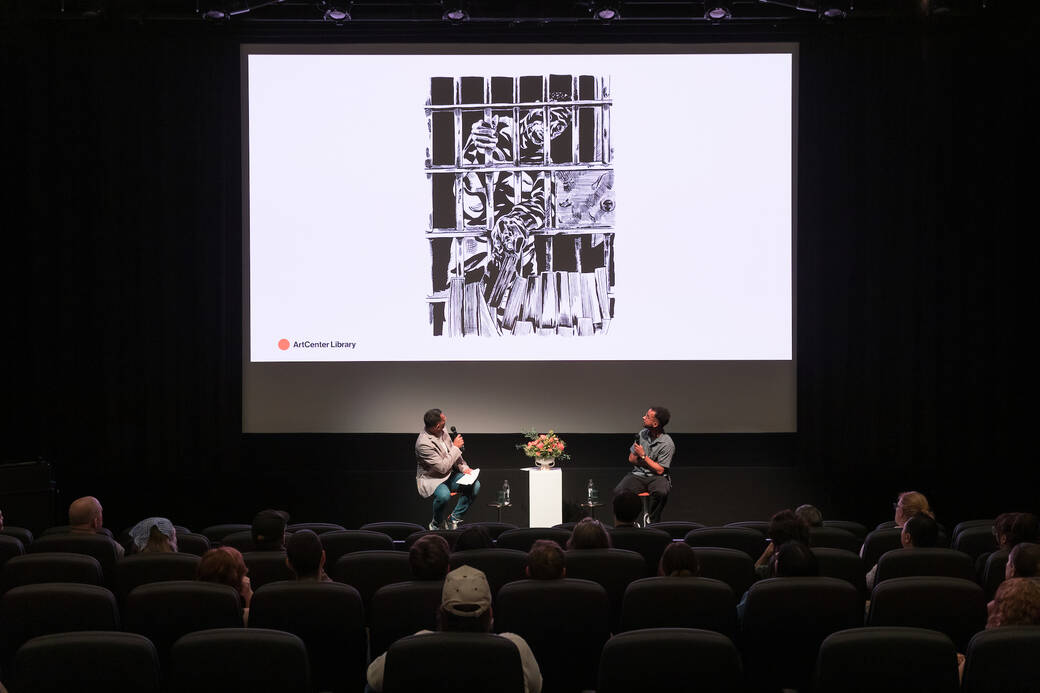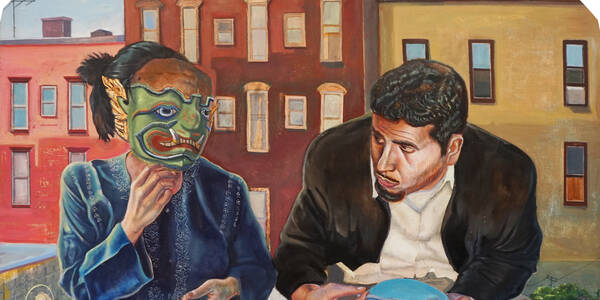
feature / alumni / college-news / illustration / diversity
June 28, 2024
By Solvej Schou
Alum Medar de la Cruz discusses his 2024 Pulitzer Prize-winning work and his experience at ArtCenter
The illustrator spoke at the ArtCenter Library-hosted event Movement through Line: A Conversation with Medar de la Cruz, part of IdentificarX exhibition programming celebrating our Latina/e/o/x alumni
In an ArtCenter Library-hosted event on Wednesday, June 26, alum Medar de la Cruz (BFA 2016 Illustration) spoke powerfully about his written and illustrated The New Yorker piece “The Diary of a Rikers Island Library Worker,” which won a 2024 Pulitzer Prize, and about his experience at ArtCenter.
Held at the Ahmanson Auditorium on ArtCenter’s Hillside Campus, the event—Movement through Line: A Conversation with Medar de la Cruz—was part of programming for the ArtCenter exhibition IdentificarX celebrating our Latina/e/o/x alumni.
“There’s something about reading a book—I've always seen it as like a whisper, you know?” said de la Cruz, in conversation on stage with Mario Ascencio, ArtCenter Library’s college librarian and managing director. “I can be on the train, or in ArtCenter’s library, feeling like somebody's whispering something in my ear, and it's just coming out of this book.”
I came here to go to ArtCenter, and the way that it shaped my career was because of a lot of the friends I’m looking at right now, who are out here supporting me.
Medar de la CruzAlum and illustrator

Raised in Miami and based in Brooklyn, the Dominican American alum works as a freelance artist and illustrator, exploring themes of social justice and human experience, and has created work for The New York Times and The New Yorker. As an ArtCenter student, de la Cruz worked at the ArtCenter Library as a library assistant, and he was a zine intern for ArtCenter's inaugural federally funded Institute of Museum and Library Service (IMLS) grant. He helped coordinate and teach zine workshops, and he also taught a zine workshop at the Pasadena Public Library.
At Wednesday’s event, the audience included a large group of de la Cruz’s alumni friends, such as surfer and illustrator AJ Dungo (BFA 16 Illustration) and artist Chris Youssef (BFA 14 Illustration), and also ArtCenter Trustees Bruce Heavin (BFA 93 Illustration), Kevin G. Bethune (MS 12 Industrial Design) and Linda A. Hill. As Ascencio pointed out, de la Cruz—as a student—was a recipient of ArtCenter’s Bruce Heavin and Lynda Weinman Endowed Scholarship.
“I came here [from Miami] to go to ArtCenter, and the way that it shaped my career, and myself as an illustrator, was because of a lot of the friends I’m looking at right now, who are out here supporting me,” said de la Cruz. “They supported me while I was a student, and they inspired me quite a bit. … When my [The New Yorker] article was ready and done, they were the first people that I let see it. I can't believe they're all here. My heart right now is huge.”
After moving to New York City after he graduated in 2016, de la Cruz did different jobs, including working at the New York Public Library and in marketing. Then he started working as a Brooklyn Public Library outreach coordinator and library assistant, which included providing books through a mobile library to inmates at New York’s Rikers Island jail complex.
De la Cruz revealed to the audience that he applied for the job, in an emotional cover letter, after a district attorney—finding out that he was an artist—encouraged him by email to pursue an opportunity to work with youth coming out of jail, after de la Cruz spent a few nights in jail.
“I almost broke down in tears when I saw that, because I felt, all of a sudden, that I can turn that terrible experience into something,” said de la Cruz. “Here’s this person screaming for medical attention, and not getting it. There's this bathroom, and the toilet isn’t flushing. How is this the best city in America, in the best country in the world, supposedly? This is how people are being treated? That's what pushed me to it. Not to mention, I'm a person of color, and 99% of the people there are people of color. I feel like I'm trying to do something for people who look like me. That's what inspired me to seek this out. It was not just another job. It was a calling.”

De la Cruz also mentioned that he was aware that a large population of inmates at Rikers Island were also Dominican, and spoke Spanish, like him.
“I was aware that I had something to offer, and that perhaps other folks on my team would not be as familiar with the population as I was, and I was right,” he said. “I was able to be the person who spoke in Spanish to the people I was providing services to, and I became familiar with people. It turns out that a lot of people read comics. I could talk to them about that.”
Since phones and cameras aren’t allowed on Rikers Island, de la Cruz would draw moments from his work from memory. Announcing his job, at the time, he posted a drawing on his social media of an inmate reaching through jail bars for books on the mobile library cart. The drawing caught the attention of The New Yorker’s Digital Design Director Aviva Michaelov, who asked to see journal entries that de la Cruz had created of his experience.
Over seven months, they worked pulling together de la Cruz’s visually-driven 2023 The New Yorker piece “The Diary of a Rikers Island Library Worker,” documenting his experience, and using his bold black-and-white drawings humanizing inmates and staff. Personal and impactful, and de la Cruz’s first illustrated journalism piece, it won the 2024 Pulitzer Prize in Illustrated Reporting and Commentary. He is currently working on a book based on the piece, he said.
That initial drawing that de la Cruz posted on social media, he said, became the basis for the first drawing—an ink illustration—in the piece. As he writes in the article, “I’m always moved by the sense of gratitude and warmth that some people express when we’re able to get them the books that they asked for. Rikers is one of the world’s most notorious jails. Incarcerated workers built it on a foundation of garbage, and New York City packs it with about six thousand people, most of whom are awaiting trial. Many simply can’t afford bail. Some stay for years.”

As Ascencio scrolled through a slideshow of different illustrations in de la Cruz’s illustrated story, ranging from a drawing of him pushing the mobile cart of books through a long narrow hallway of jail cells—“a nightmare situation,” de la Cruz said—to a drawing of an infirmary ward with most elderly inmates, the alum reflected on the impact of helping choose books for inmates. Urban fiction is popular on Rikers Island, he noted, and he tried to also introduce other genres.
“Our services are not just the books themselves, but the librarian pushing the book,” said de la Cruz, about librarians’ talking to inmates, getting to know them. “It's the only service, even outside of the jail, that people can go home with a physical object without having paid a single dollar. It's empowering to make that type of decision, as an incarcerated person, and as a person in the free world. People would tell us every day, ‘They tell us when we get to watch TV, but they can't tell me when I get to stop reading.’”
Asked about the ArtCenter Library being his own safe space, while he was a student, de la Cruz credited supportive ArtCenter librarians, and being able to “hide between these shelves,” where he sought out zines, magazines and books on photography, graffiti and more.
His passion for social impact advocacy began as an ArtCenter student, he said. He became president of Chroma, a then student club created by and for Black students, and he noted that he never had a Black or Latinx professor during his five years studying at the College. He advocated to ArtCenter leadership to hire more Black faculty. He created work about race and incarceration in the ArtCenter course Illustrated Journalism. After former President Donald Trump was elected president in 2016, he felt like he had to speak up even more, he said.
Turning to the audience, de la Cruz also suggested that students seeking out counseling at the College, which he never did during his time as a student, as a way to balance work, school and life. He encouraged them too to seek out resources at the ArtCenter Library.
“Now I have therapy, and I go surfing, I go skateboarding,” he said. “It's hard to live in a big city. It's hard to make a living as an artist. It’s easy to let it destroy you, you know? I try to do things that are fun.”





